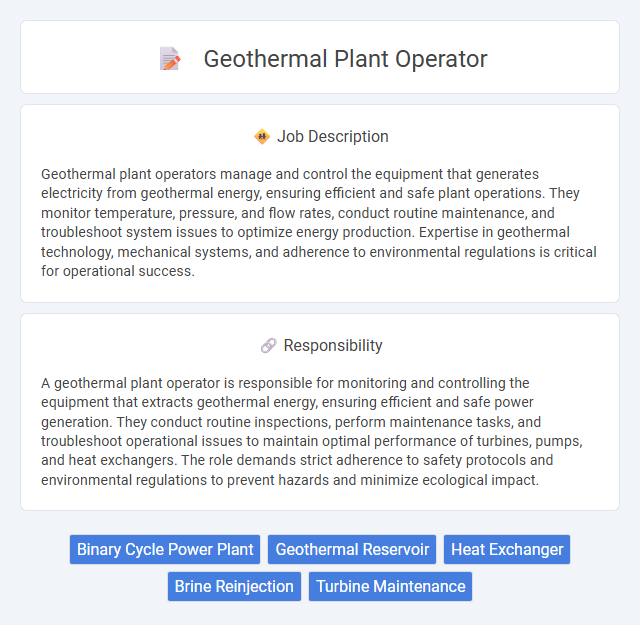
Geothermal plant operators manage and control the equipment that generates electricity from geothermal energy, ensuring efficient and safe plant operations. They monitor temperature, pressure, and flow rates, conduct routine maintenance, and troubleshoot system issues to optimize energy production. Expertise in geothermal technology, mechanical systems, and adherence to environmental regulations is critical for operational success.
Individuals with a strong understanding of mechanical and electrical systems and the ability to work in physically demanding environments are likely to be suitable for a geothermal plant operator role. Candidates who are comfortable with irregular shifts, can handle outdoor conditions, and possess problem-solving skills may have a higher probability of success in managing geothermal plant operations. Those prone to health issues aggravated by noise, heat, or extended periods of standing might face challenges in this position.
Qualification
A Geothermal Plant Operator requires technical expertise in mechanical, electrical, and control systems specific to geothermal energy conversion processes. Essential qualifications include a diploma or degree in engineering or renewable energy technology, along with hands-on experience in plant operations and maintenance. Certification in safety protocols and knowledge of environmental regulations enhance the operator's ability to manage equipment efficiently and ensure sustainable energy production.
Responsibility
A geothermal plant operator is responsible for monitoring and controlling the equipment that extracts geothermal energy, ensuring efficient and safe power generation. They conduct routine inspections, perform maintenance tasks, and troubleshoot operational issues to maintain optimal performance of turbines, pumps, and heat exchangers. The role demands strict adherence to safety protocols and environmental regulations to prevent hazards and minimize ecological impact.
Benefit
Working as a geothermal plant operator likely offers significant benefits such as steady employment in a growing renewable energy sector and competitive wages due to specialized skills required. Operators may experience job satisfaction from contributing to sustainable energy production and environmental conservation. Opportunities for professional growth and access to advanced technology could further enhance career prospects and personal development.
Challenge
Working as a geothermal plant operator likely involves managing complex systems to harness energy from the earth's heat, which might present technical and safety challenges. Operators may frequently encounter unpredictable equipment issues or fluctuations in geothermal activity, requiring quick problem-solving skills. Ensuring optimal plant performance could demand constant monitoring and adjustments under potentially high-pressure conditions.
Career Advancement
Geothermal plant operators manage and maintain equipment that generates electricity from geothermal energy, requiring specialized technical skills and knowledge of geothermal systems. Career advancement opportunities often include progressing to senior operator roles, plant supervisor, or technical specialist positions that oversee multiple facilities or complex systems. Gaining certifications, expanding expertise in renewable energy technologies, and developing leadership skills enhance prospects for higher-paying management roles within the geothermal energy industry.
Key Terms
Binary Cycle Power Plant
A Geothermal plant operator in a Binary Cycle Power Plant manages the extraction of heat from geothermal fluids without direct contact between the steam and turbine, utilizing a secondary working fluid with a lower boiling point to drive electricity generation efficiently. They monitor system parameters such as temperature, pressure, and flow rates to ensure optimal performance and safety of the heat exchangers and turbines. Expertise in handling organic Rankine cycle equipment and troubleshooting binary heat exchangers is essential for maximizing plant reliability and energy output.
Geothermal Reservoir
Geothermal plant operators manage and monitor geothermal reservoirs to ensure optimal heat extraction and sustainable energy production. They analyze reservoir pressure, temperature, and fluid chemistry to maintain efficient steam flow and prevent reservoir depletion. Regular reservoir assessment and well maintenance are critical tasks to maximize the lifespan and output of geothermal energy systems.
Heat Exchanger
Geothermal plant operators specialize in managing heat exchangers, crucial components that transfer thermal energy from geothermal fluids to secondary systems for electricity generation. Proficient operation and maintenance ensure optimal heat transfer efficiency, preventing scaling and corrosion that can reduce plant performance. Expertise in monitoring temperature differentials, flow rates, and pressure levels within heat exchangers directly impacts the reliability and output of geothermal power plants.
Brine Reinjection
Geothermal plant operators specializing in brine reinjection manage the critical process of returning used geothermal fluids back into the reservoir to sustain pressure and enhance resource longevity. Their responsibilities include monitoring injection rates, maintaining equipment integrity, and ensuring compliance with environmental regulations to prevent surface contamination and subsidence. Proficient knowledge of thermodynamics, fluid mechanics, and chemical properties of geothermal brines is essential for optimizing reinjection efficiency and plant performance.
Turbine Maintenance
Geothermal plant operators specializing in turbine maintenance ensure optimal performance and longevity of geothermal turbines by conducting regular inspections, diagnosing mechanical issues, and performing essential repairs or replacements. Expertise in turbine blade alignment, lubrication systems, and vibration analysis is critical to prevent downtime and maximize energy output. Proficiency with monitoring software and adherence to safety protocols are vital for maintaining operational efficiency and environmental compliance.
 kuljobs.com
kuljobs.com